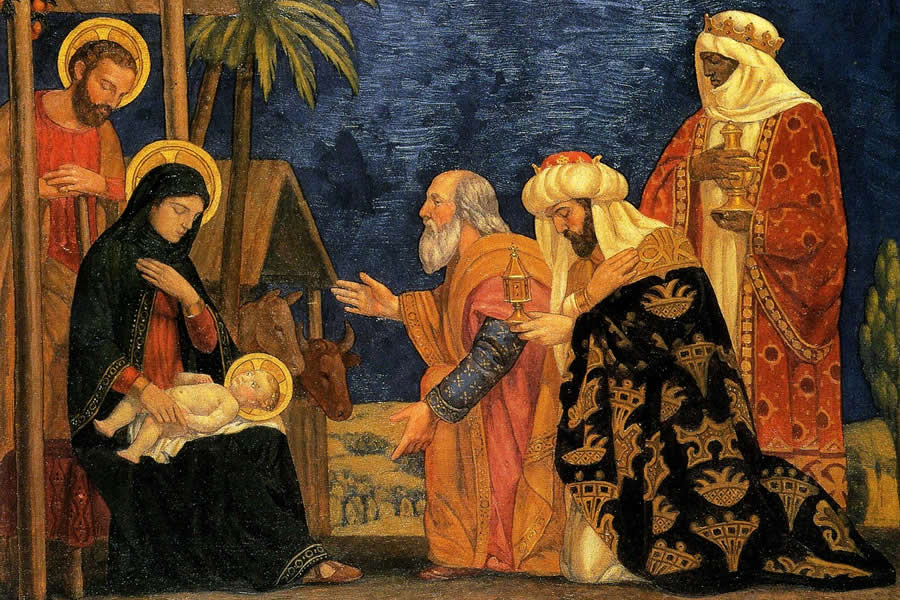St. Francis of Assisi Weekly Reflections
Elevation
01-28-2018Liturgy CornerFr. Paul Turner © 2001 Resource Publications, Inc.While reciting the words of Jesus from the Last Supper, the presider of the Mass shows the consecrated bread and wine to the assembly. His gesture is called the elevation. With each elevation he actually performs two actions. He shows the body and blood of Christ to everyone else, and then he genuflects in adoration. There is no explicit instruction for what the assembly is to do during the elevation. However, because the presider is instructed to show them the sacred elements, the obvious conclusion is that they should watch. Many worshipers lower their eyes and bow their head in adoration as the presider performs the elevation. This bow, well-meaning in its devotion, probably belongs more with the genuflection that follows the elevation.
READ MORESharing Good News
01-28-2018Question of the Week- Reading I: Deuteronomy 18:15-20 - A prophet like Moses
- Reading II: 1 Corinthians 7:32-35 - The state of virginity
- Gospel: Mark 1:21-28 - Cure of a demoniac
- Key Passage: They were astounded at his teaching, for he taught them as one having authority, and not as the scribes. (Mark 1:22)
- Adults: What can you tell others about Jesus with the most assurance?
- Kids: What is the most important thing you would like others to know about Jesus? How will you show or tell them?

Have you found Healing in the Word of God?
01-28-2018Weekly ReflectionWe Celebrate Worship Resource, Vol. 43, No. 1There is power in a name. The unclean spirit in Mark's Gospel tries to use that power. In that time, people believed that demonic forces could try to gain power over an enemy by uttering their name. In Mark, the unclean spirit calls out "Jesus of Nazareth...I know who you are—The Holy One of God!" (Mark 1:24). Normally the one attempting to drive out the demonic spirit would respond with the name of one more powerful. But Jesus has no need to do this. He speaks, literally, in the name of God. In fact, the people already recognized him as speaking with authority when he taught in the synagogue. So he can command unclean spirits with his own authority and they obey him. The Lord tells Moses in the first reading, "I will raise up for them a prophet like you from among their kin, and will put my words into his mouth" (Deuteronomy 18:18). Jesus has this authority that Moses prophesied, the authority the unclean spirit obeyed, the authority the people of Capernaum recognized in his words. Jesus' word, the "good news," still has that power today—the power to heal people of the unclean spirits that afflict them.
What "unclean spirits" do we encounter today? Has the word of God given you guidance, hope, or healing?
READ MOREForgiveness at Mass
01-21-2018Liturgy CornerFr. Paul Turner © 2001 Resource Publications, Inc.The sacrament of reconciliation is the church's special celebration of pardon, but forgiveness of sins is also one of the fruits of the Mass. There are many moments throughout the Eucharistic celebration when the texts and gestures of the Mass express the community's sorrow for sins.
We begin with a penitential rite, which may include striking the breast in a simple gesture of sorrow. The presider then asks that God have mercy on us and forgive our sins. On Sundays this penitential rite may be replaced with a sprinkling rite, signifying our purification. While singing the Glory to God and the Lamb of God, we ask the One who takes away the sins of the world to have mercy on us. When the deacon or priest kisses the Gospel, he prays that its words may wipe away our sins. While washing his hands, the priest asks God to wash away his iniquity and cleanse him of sin. During the Lord's prayer we all ask God to forgive our sins.
READ MORERepent and Believe
01-21-2018Question of the Week- Reading I: Jonah 3:1-5, 10 - Conversion of Nineveh
- Reading II: 1 Corinthians 7:29-31 - Encouragement within a hostile world
- Gospel: Mark 1:14-20 - Call of the first disciples
- Key Passage: Now after John was arrested, Jesus came to Galilee, proclaiming the good news of God, and saying, "The
time is fulfilled, and the kingdom of God has come near; repent, and believe in the good news." (Mark 1:14–15)
- Adults: What part of your life is Jesus calling you to change right now?
- Kids: In what way do you think you can be a better follower of Jesus?

Come after me and I will make you Fishers of Men
01-21-2018Weekly ReflectionWe Celebrate Worship Resource, Vol. 43, No. 1"Repent and Believe" could be the headline for the scripture readings today. In the first reading, Jonah journeys to Nineveh with this warning and the people comply immediately. It is important to note that Nineveh had been the chief enemy of Israel but that the book of Jonah was written centuries later. But even then, Nineveh was still regarded as one of the most hateful and cruel oppressors of Israel. In reality, they never repented. But this story is not told to teach history; it is told to show how willing God is to forgive. God could forgive even Nineveh despite all the horrible things they had done if they would only repent and believe. In Mark, Jesus proclaims, "This is the time of fulfillment. The kingdom of God is at hand. Repent, and believe in the Gospel" (Mark 1:15). But Jesus asks for more than just belief. Conversion is more than just a change of heart. It must lead to a change in conduct. Jesus then goes on to call his first four disciples: "Come after me, and I will make you fishers of men" (Mark 1:17). This is the essence of discipleship—following Jesus ("come after me") and sharing the good news ("fishing" for others).
Are you ready to be a disciple of Jesus?
READ MOREEpiphany Chalk
01-14-2018Liturgy CornerFr. Paul Turner © 2001 Resource Publications, Inc.edited by Jonathan Branton
Some Christians bless their homes on Epiphany each year. With chalk, they write an inscription on the inside lintel above the door. The series of numbers, letters and crosses changes only slightly from year to year. For example, at the start of the year 2017, the line will read as follows: 20 + C + M + B + 17.
READ MORECome and See
01-14-2018Question of the Week- Reading I: 1 Samuel 3:3b-10, 19 - Revelation to Samuel
- Reading II: 1 Corinthians 6:13c-15a, 17-20 - Against sexual immorality
- Gospel: John 1:35-42 - The first disciples
- Key Passage: They said to him, "Rabbi" (which translated means Teacher), "where are you staying?" He said to them, "Come and see." They came and saw where he was staying, and they remained with him that day. (John1:38b–39)
- Adults: What qualities do you have that would cause others to recognize you as a disciple of Jesus?
- Kids: What does it take to be a follower of Jesus?

Behold the Lamb of God
01-14-2018Weekly ReflectionWe Celebrate Worship Resource, Vol. 43, No. 1Today we hear the stories of people being called unexpectedly by the Lord. In the first reading, it takes a few times before Samuel realizes that God is calling him; he believes it is his mentor, Eli, who calls out to him as he sleeps. It is only after Eli instructs him to respond, “Speak, Lord, for your servant is listening” that Samuel responds appropriately (1 Samuel 3:19). In the Gospel, Andrew also needs the testimony of a more knowledgeable person, in this case, John the Baptist. When John points out the stranger—“Behold the Lamb of God”—Andrew and another disciple hear him and immediately follow Jesus (John 1:36). Andrew in turn tells his brother, Simon Peter, “We have found the Messiah” (John 1:41). The church year has moved into Ordinary Time now and it is appropriate that these invitations come on otherwise ordinary days. We are no longer at the manger, nor are we at the empty tomb. Neither Samuel nor Andrew witnessed a historic event. But their ordinary day (or night) turned momentous because of their encounter with the Lord.
Are you ready to be called by the Lord? What will be your response?
READ MORE
There are no Foreignors in Christ
01-07-2018Weekly ReflectionWe Celebrate Worship Resource, Vol. 43, No. 1The focus of today's readings is on outsiders, for on Epiphany we celebrate the manifestation of the Lord to all people. In Isaiah, the Chosen People themselves are outsiders, for they are returning from fifty years of exile to a desolate Jerusalem. The city and the temple needed to be rebuilt. Looking outward, they had faith that Jerusalem would soon shine forth as a beacon to foreign lands. In the Gospel, the magi traveled to Bethlehem from afar to seek the child. They were foreigners, and they are the first in Matthew's Gospel to pay Jesus homage. The passage ends with the magi spurning Herod as they returned home, but Matthew goes on to tell how the Holy Family fled to Egypt in order to avoid the homicidal king. The infant Jesus and his parents become refugees in a foreign country, a country which had been a sworn enemy centuries before. Exiles, foreigners, and refugees; they play the main roles in today's readings. They play the main role in the formation and the mission of the Church. Truly, we are all "members of the same body" (Ephesians 3:6). There are no foreigners in Christ.
Do you welcome those looking for a home—in your parish, your community, your country?
READ MOREEpiphany on Sunday
01-07-2018Liturgy CornerFr. Paul Turner © 2005 Resource Publications, Inc.On many calendars, Epiphany falls on Jan. 6. But the Catholic Church in the United States celebrates it on whatever date Sunday falls during the week of Jan. 2. "Epiphany" means "manifestation," and it celebrates the day that the infant Jesus revealed his divinity to the magi. Traditionally, this event is connected with two others from the Gospels: the baptism of Jesus and the wedding at Cana. In all these events, the mystery of Christ became more manifest. The magi, coming from the East, signify that gentile nations – not just Jewish nations – were coming to recognize Jesus as the savior of the world.
READ MOREOvercoming Jealousy
01-07-2018Question of the Week- Reading I: Isaiah 60:1-6 - Glory of the new Zion
- Reading II: Ephesians 3:2-3a, 5-6 - Commission to preach God's plan
- Gospel: Matthew 2:1-12 - The visit of the magi
- Key Passage: Then Herod sent the [magi] to Bethlehem, saying, "Go and search diligently for the child; and when you have found him bring me word so that I may also go and pay him homage" (Matthew 2:8)
- Adults: When have you been jealous or fearful of another person? When are such feelings harmful?
- Children: When have you been jealous because something good happened to another person instead of you? What is the problem with feeling that way?